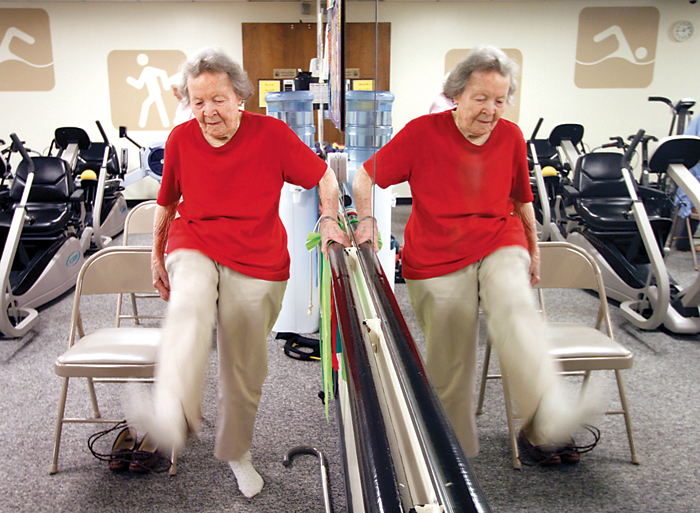Born in 1911 in Memphis - three years after the first Model-T Fords hit the road and three years before the start of World War I - Dorothy Nixon will turn 100 this spring.
The way she describes it, reaching 100 years of age is almost an act of willpower.
A positive attitude and strong will are crucial to staying active and engaged late in life, even when you don't feel up to it, said Nixon, who lives in an apartment at Alexian Village on Signal Mountain.
Nearing 100, "you don't ever feel just perfectly good. You feel sleepy and lazy and slow. You have to just absolutely make yourself do these things" to stay active, she said.
For Nixon, that includes a 40-minute exercise class at Alexian three times a week.
"They call it 'chair exercise,' which sounds awful sissy, but it's not. You do get up and stand up and work your legs," she said.
Researchers are finding evidence that attitude plays a critical role in healthy aging.
With the disclaimer that there's no secret recipe for reaching 100 years old in good health, researchers with the Georgia Centenarian Study have concluded that a combination of attitude and personality traits are key to longevity.
Keeping centenarians healthy and independent for as long as possible will become increasingly important. Many more people will live into very old age over the next five decades, said Leonard Poon, director of the Institute of Gerontology in the University of Georgia College of Public Health and lead author of the study.
Nearly 64,000 centenarians live in the United States now. That number is expected to explode to 601,000 by 2050, according to 2009 estimates from the U.S. Census Bureau.
The predictions are based on a burgeoning U.S. population as well as rising average life expectancy, said David Waddington, chief of the population projections branch of the U.S. Census Bureau.
The first baby boomers will begin turning 100 in 2046, likely resulting in a surge in centenarians, he said.
"It's the egg going through the snake," he said.
Life expectancy has increased rapidly over the past century, particularly with the advent of antibiotics for infectious disease, according to the U.S. Centers for Disease Control and Prevention.
Life expectancy in the U.S. is now 77.8 years, compared to 49.2 years in 1900, according to the Congressional Research Service.
ATTITUDES MATTER
BY THE NUMBERS64,000: Centenarians in the U.S. today601,000: Centenarians expected in the U.S. by 2050962: Centenarians in Tennessee1,135: Centenarians in Georgia80: Centenarians in ChattanoogaSource: U.S. Census Bureau
A recent overview from the Georgia Centenarian Study found centenarians' attitudes about their health and their overall life satisfaction were strong predictors of survival and a higher quality of life in old age.
The study is one of only two focused on centenarians in the United States funded by the National Institute on Aging.
The research, published in the journal Current Gerontology and Geriatrics Research, compiled data from 244 people over age 100 between 2001 and 2009.
Genetics accounts for about 30 percent of longevity, "and that means 70 percent is due to something else other than heredity," said Poon.
Personality, which affects one's ability to cope with stress, appears to play a role in reaching old age in good health. Healthy centenarians tend to be more competent, extroverted and trusting and less neurotic, according to the study.
Centenarians who recalled more positive life events over their lifetimes tended to be happier than those who recounted many negative life events. That suggests they coped better with critical events and kept a more positive outlook, Poon said.
"Your perception of what is happening to you is very, very important," he said. "It is the lens that we look through in interpreting what's happening to us."
SAGE WISDOM
DOCUMENT DOWNLOADSPDF: Centenarian Study
Dr. Lorna Birch is a geriatrician at Alexian Brothers Community Services PACE program, an adult day health care program including meals, recreational therapy, nursing and other services.
Birch emphasized the importance of lifestyle in longevity. An active lifestyle should include at least 30 minutes of exercise five days a week and a diet of natural, not processed, foods, she said.
"I certainly think they go hand in hand" with attitude, she said.
Nixon said there's no secret to longevity, but she shared some sage wisdom passed down by her grandfather, a physician. He told her to drink a glass of water every day before breakfast. She said she still does it to this day.
Nixon said people should develop healthy habits early in life and stay attuned to their bodies.
"Listen to your body. Your body will tell you what it needs," she said.

